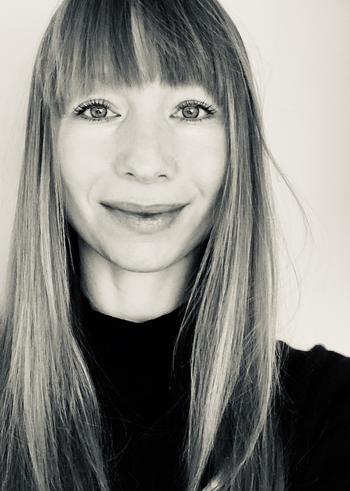Karlotta Jule Bahnsen

Freie Universität Berlin
ZI Lateinamerika-Institut
Wissenschaftliche Mitarbeiterin
Altamerikanistik/Kultur- und Sozialanthropologie
Rüdesheimer Str. 54-56
Raum 234
14197 Berlin
Sprechstunde
nach Vereinbarung per E-Mail für Webex Meeting/in Präsenz
- seit 2021 Mitglied des Dezentralen Wahlvorstands des ZI Lateinamerika-Instituts
- 2020 Mitglied des Organisationsteams der OnlineTagung "Mercado de Saberes para el intercambio de conocimientos", ein Projekt in Zusammenarbeit mit dem Internationalen Graduiertenkollegs "Temporalities of Future"
- 2019-2020 Mitglied im Institutsrat des ZI Lateinamerika-Instituts als Vertreterin der wissenschaftlichen Mitarbeiter*innen
-
seit 2018 Promotion am LAI im Fachbereich Kultur- und Sozialanthropologie/ Altamerikanistik bei Prof. Dr. Ingrid Kummels
- seit 2018 Zertifizierung in Hochschuldidaktik im Support Programm der Freien Universität Berlin
- 2017-2018 Lehrende im interkulturellen Vorbereitungsprogramm für chinesische Schüler*innen auf einen Schulaufenthalt in Deutschland, SDG Education, Shanghai
-
2017 Promos Stipendiatin des DAAD für Forschungsaufenthalt in Argentinien
-
2015-2017 Master of Arts Interdisziplinäre Lateinamerikastudien, Freie Universität Berlin
-
2015 Zertifizierung als Interkulturelle Trainerin, IKUD Seminare, Göttingen
- 2011-2015 Lehrende für DaF am Goethe Institut und CUI, Centro Universitatio de Idiomas, Buenos Aires, Argentinien.
-
2012-2013 Zertifizierung Methodik und Didaktik des fremdsprachigen Deutschunterrichts, Goethe Institut
-
2011 Stipendiatin im Graduiertenprogramm Leonardo da Vinci in Madrid, Spanien
-
2008-2010 Deutsche Welle Berlin, freie Mitarbeit in Onlineredaktion
-
2008-2010 IBI – Institut für Bildung in der Informationsgesellschaft, kulturelle Bildung in Jugendstrafvollzugsanstalten in Berlin
-
2007 Erasmusstipendium, Hochschule für darstellende Kunst Malaga (ESAD), Spanien
-
2010 Diplom Kulturwissenschaften und ästhetische Kommunikation, Universität Hildesheim
Lehre im Master Interdisziplinäre Lateinamerikastudien
Wissenschaftspraxis I: Betreuung von Masterstudierenden bei der Erarbeitung wissenschaftlicher Forschungsprojekte
Kernmodul II, Konstituierung Lateinamerikas: "Globalización y trabajo precario. Mujeres en espacios laborales desiguales"
Kernmodul II, Konstituierung Lateinamerikas: "Migration in den Amerikas. Historische und aktuelle Entwicklungen"
Projektmodul I, E-Learning: Ethnographische Forschungsmethoden
Lehre im Bachelor Sozial- und Kulturanthropologie
Modul 5: Ethnografien / Politik & Wirtschaft: Producing Gender on the Factory Floor. Ethnographien zum Nexus von Migration, Gender und Textilarbeit.
Forschungsschwerpunkte:
-
Transnationale Migration und "Globalization from Below"
-
Migration und Gender
-
Arbeitsmigration und Ethnic Economies
Regionale Schwerpunkte:
-
Argentinien
-
Bolivien
-
China
Promotionsvorhaben:
"Bolivianische Textilarbeiterinnen in Buenos Aires. Aushandlungsprozesse um Mobilität und (Un)Gleichheit im transnationalen Raum der Mode."
Abstract:
The dissertation analyzes the situation of migrant workers from Bolivia in the Argentinian fashion industry from an anthropological perspective. It focuses on the nexus of transnational networks of migration and production, paying special attention to gender relations and intersectional inequality in both realms. The work is based on ethnographic fieldwork in the urban garment sector of Buenos Aires.
The project aims at drawing attention to the participation of Bolivian migrant garment workers in the specific context of Buenos Aires' fashion ecology and in the related social, economic, and cultural processes and relations that are shaped and take place locally and transnationally. The global garment industry is characterized by especially precarious working condition and subcontracting. Since Argentina’s urban garment sector produces mainly for its domestic market and does not form part of production chains of transnational firms that produce for export, it forms part of a regional circuit of production and consumption based in the Global South. Circular patterns of mobility link Argentina, Brazil, Bolivia, Paraguay, and Peru in a ‘transnational space of fashion’ in Latin Americas Southern Cone. In this context, the border-crossing mobility of involved social actors has constructed transnational social networks nourishing the demand for cheap migrant labor for the local fashion production in São Paulo and Buenos Aires but also constitutes processes of "globalization from below" (Lins Ribeiro).
While the precarious working conditions and exploitation within the fashion industry has been emphasized in previous academic research, the ethnographic research at the core of this investigation aims at detecting possibilities of agency as well as social- and spatial mobility within this particular context and across national and imaginary borders. Gender relations are further focused for their relevance in both, migration and work at the “global assembly line” that construct an intersectional scheme of inequality shaping the specific situation of migrant garment workers from Bolivia in Buenos Aires.
Bahnsen, Karlotta Jule (2021): "Sustaining the Commodity Chain of Garments 'Made in Argentina' along Power Asymmetries: Bolivian Garment Workers in Buenos Aires". In: Alba, Ximena and Miranda, Bruno (eds.) Migrant Labor in Global Chains, Fragmentierte Moderne in Lateinamerika, vol. 20, Berlin: tranvía Verlag Walter Frey, pp. 149-175.
Online Publikation der Konferenz "Mercado de Saberes para el intercambio de conocimientos", Konferenz des Bereichs der Kultur- und Sozialanthropologie und Altamerikanistik des Lateinamerika Instituts und des International Graduiertenkollegs "Temporalities of Future", 2020.

